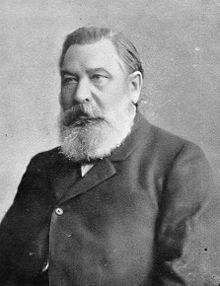Heinrich von Treitschke
| Heinrich von Treitschke | |
|---|---|

Heinrich von Treitschke
|
|
| Born |
15 September 1834 Dresden, Kingdom of Saxony |
| Died | 28 April 1896 (aged 61) Berlin, Germany |
| Nationality | German |
| Occupation | Historian |
| Employer | Freiburg and Berlin Universities |
Heinrich Gotthard von Treitschke (15 September 1834 – 28 April 1896) was a nationalist German historian, political writer and National Liberal member of the Reichstag during the time of the German Empire. He was an outspoken nationalist, who favored colonialism, and opposed the British Empire, and the Catholics, Poles and socialists inside Germany.
Treitschke was born in Dresden. He was the son of an officer in the Saxon army who rose to be governor of Königstein and military governor of Dresden. Treitschke went deaf at a young age, and so was prevented from entering public service. After studying at the universities of Leipzig and Bonn, where he was a student of Friedrich Christoph Dahlmann, he established himself as a Privatdozent at Leipzig, lecturing on history and politics. At one point he became very popular with the students, but his political opinions made it impossible for the Saxon government to appoint him to a professorship.
At that time Treitschke was a strong Liberal; he hoped to see Germany united into a single state with a parliamentary government, and all the smaller states swept away.
He supported colonialism, stating:
It also discusses the Social Darwinian theories of brutal competition among races. In an essay published in 1862, Treitschke praised the "pitiless racial struggle" of Germans against Lithuanians, Poles and Old Prussians; he claimed that "magic" emanated from "eastern German soil" which had been "fertilised" by "noble German blood". While his main objective was to give historical legitimisation to Germanising of Poles that found themselves under Prussian rule, the praise of a mythical migration eastward conducted by German ancestors would eventually become a means of legitimising claims to further eastern territories.
In 1863 he was appointed professor at Freiburg; in 1866, at the outbreak of the Austro-Prussian War, his sympathies with the Kingdom of Prussia were so strong that he went to Berlin, became a Prussian subject, and was appointed editor of the Preussische Jahrbücher. His violent article, in which he demanded the annexation of the Kingdoms of Hanover and Saxony, and attacked with great bitterness the Saxon royal house, led to an estrangement from his father, a personal friend of the king. It was only equalled in its ill humour by his attacks on Bavaria in 1870. After holding appointments at Kiel and Heidelberg, he was made professor at Humboldt University in Berlin in 1874.
...
Wikipedia
